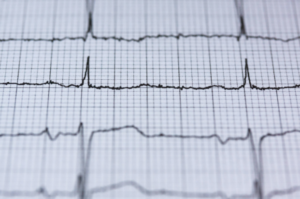
February is American Heart Month, and a great time for all of us to focus on our heart health. Cardiovascular disease is unfortunately the number one cause of deaths in the United States, bringing over 600,000 deaths per year. In light of American Heart Health month, we wanted to highlight the amazing connection between eye and heart health.
We all know how important it is to keep our hearts healthy and strong. But did you know that our eyes can actually help us identify potential cardiovascular problems? This news is surprising to most people, but our eyes are actually closely connected to our heart health.
Our eye’s blood vessels are closely connected to our hearts through our retina vasculature. These are the arranged blood vessels in the back of our eyes. Thanks to this connection, any issues we find with our eyes can be linked directly to problems with our hearts and blood vessels in the body.
Doctor’s can analyze these issues by examining different parts of the eye such as the pupil, lens, retina, and optic nerve. Narrowing of retinal arteries, dilation of retinal veins, and arteriovenous nipping are some signs of increased cardiovascular risk.
Diabetic Retinopathy & Heart Health

For patients with diabetes, high blood sugar levels can lead to problems in the eye’s small blood vessels. This can increase the patient’s risk for developing diabetic retinopathy and potentially lead to future blindness, kidney problems, and heart issues.
Diabetes has been known to cause problems with the heart, but thankfully people can find out if they’re at risk for cardiovascular issues by scheduling an eye exam with their doctor. Regular eye check ups are essential for catching potential problems and treating them early on.
Eye Health & High Blood Pressure

These days, your eye doctor can determine whether you may have high blood pressure by looking at your eyes. Also known as hypertension, high blood pressure occurs when the force blood on artery walls is too strong. This pressure can lead to retinopathy or even damage the eye’s main source of blood.
Changes in retinal vessels can indicate high levels of blood pressure and/or high cholesterol. If retinal arteries and veins have an irregular size ratio, it can indicate these issues are becoming problematic for certain patients.
Another eye condition that can affect the heart is an arterial embolism. This happens when an embolus getes stuck in small blood vessels or organs like the retina, resulting in restricted or blocked blood flow. Emboli’s in the eye can come from plaque in the carotid artery, which is the main artery that delivers blood to the head and neck. They can also come from emboli in the heart.
Conclusion
In conclusion, it is clear that eye and heart health are linked in many different ways. By looking at different parts of the eye, doctors can pick up on potential cardiovascular issues such as high blood pressure, high cholesterol, and blocked arteries.
For these reasons and more, it is so important to schedule an annual eye exam with your doctor. By regularly checking the eyes, your doctor can find important health indicators that go beyond your vision and extend into heart health.
Understanding your health in a broader perspective can help you build a more effective plan to prevent diseases and reduce risk for future health problems. Contact us today to schedule your eye exam!